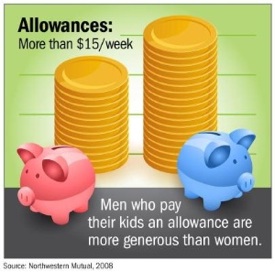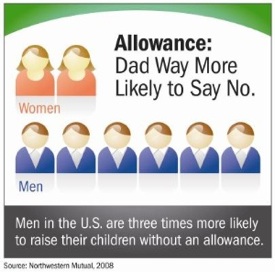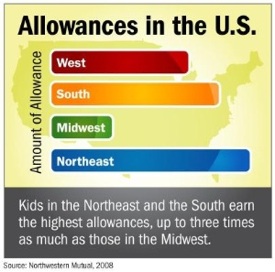At what age should parents discontinue the practice of giving allowances to their children?
I don't give an allowance to my children. Well, my daughter is almost 22, and she has a 40k a year job, so she doesn't need my allowance...LOL But my son is 15, and I've never paid him an allowance. What I do is have special 'chores' that are not ordinary house upkeep and ordinary helping out the family, and he can earn cash by doing those chores.
He also has a little side job working with my mother, serving homemade ice cream and kettle corn at county fairs and he can make good money working with her on a weekend and gets to see all the little small town fairs. I think it's important for kids to have some money of their own, but I don't agree with just 'giving' it to them. I think that creates entitlement, and I think my son needs to learn that he has to work for or somehow 'earn' what he gets.
I think even children as young as about three can 'earn' money for small chores that maybe they can spend on the ice cream man. As they get older, the chores get harder, the money gets bigger, and you add educational components to it, like piggy banks, savings accounts, etc. The lessons can be age-appropriate even at 17-18 years old, where they will have a real bank account at the bank and they have to learn to balance a checking account (kids can have checking accounts in their name with their parents on the account). This way, they learn the value of money, the use of money, savings vs. spending, and they learn to appreciate a job well done being well paid.
I think that when a child obtains a part-time job that the allowance should stop, or at least change. In exchange for things like rides to and from work, to late curfew times, to (importantly) meeting savings goals, allowance could transition into a responsible exchange. Here's a news segment that talks about allowances.It has a few interesting points: youtube.com/watch?v=XGMI3zwG_rY.
Maybe when the child is old enough to get a job instead of just earning money for chores done around the home.
When your kids are old enough to get a job around 16.
The answer to this question would hinge primarily on the tasks for which the allowance is given. If the allowance is given for duties considered above and beyond what the child should be expected to do as part of their given chores then there really is no need to discontinue the practice. You can simply adapt the practice as the child ages.
For example, one would not expect a five year old or six year old to help fold laundry, but if the child should do so then it would be cause for giving an allowance. In the same vein a sixteen year old that mows the lawn would be performing a chore rather than a task that would warrant an allowance. Now if the sixteen year old were to wash the family car then an allowance could be called for.As you can see, in this manner a habit of extending an allowance for work above and beyond the norm could extend as long as your child lives at home.
When the child is young you may want to encourage him or her to find things to do outside of a chore routine to teach the value of earning an allowance. Once you have concreted this habit you will find that children will look for ways to earn their allowance on their own.
I believe Age 12 is the oldest any child should receive an allowance. Once they reach 12-13, they're old enough and smart enough to begin to do real work for money--whether that's mowing lawns, babysitting, raking leaves, shoveling snow, or getting a paper route. If they find that extra chores and odd jobs are not to their liking, then it's a good lesson to start about not having the extra fun money at their disposal.
Besides, at 12, 13, 14 years old, you know you're going to supplement their spending a bit no matter what: $20 here for the movies, $50 there for some new jeans, etc. , but this is a point where they shouldn't be *counting* on you as a source of extra income anymore. You're not a cash machine. Right?
Now I hate to sound like an old geezer here, but you know, when I WAS 14, I already had my first real part-time job. Had to interview for it and everything! If this scrawny, shy little girl could do it, so can your teen!
Or they can learn what it's like to be a have-not. Just my opinion, but a lot of kids rely on others too much nowadays. Learning to help yourself is a really key part of growing up.
You know?

And yet...


Once the child reaches an age where you believe they are able to do some casual work. Encourage them to explore opportunities and assist them in choosing a job somewhat interesting to themselves. Advise them it will help them to start building their own savings, but also point out how cool it will be for them to be able to earn their own money, make friends and buy just about whatever they want.
I think a child should always have to earn an allowance by doing chores, as well as maintaining their grades and good behavior. This helps raise them with good values and teach them that they are not entitled to just receive without giving back in some way. It prepares them for what they will experience when they are older and have to be out in the real world.
But I digress lol With all that said, the age where the allowance should stop is either when they turn 18 or get a part time job while they are in high school. Or, if the parent chooses to continue to supplement their part time job earning in high school, then place the "allowance" in a savings account that grows with interest that the child can later use for a major purchase, such as a car for college, books or something like that.
I cant really gove you an answer,but what I can give you is a way to a solution, that is you have to find the anglde that you relate to or peaks your interest. A good paper is one that people get drawn into because it reaches them ln some way.As for me WW11 to me, I think of the holocaust and the effect it had on the survivors, their families and those who stood by and did nothing until it was too late.
Related Questions
What allowances should schools make for children with ADHD?
Should America discontinue all foreign aid and allow other countries to solve their own problems?
Should non indigenous people in the UK have to pay for health care & schooling of their brats and pay tax at basic rate with no allowances?
Should parents allow their children to sign up on Facebook knowing they do not meet the required age?
I have 7 & 8 yr. old girls who I'm going to start allowances for weekly, but how much should I give?
Are Asian children more intelligent than American children. because their parents are good role?
